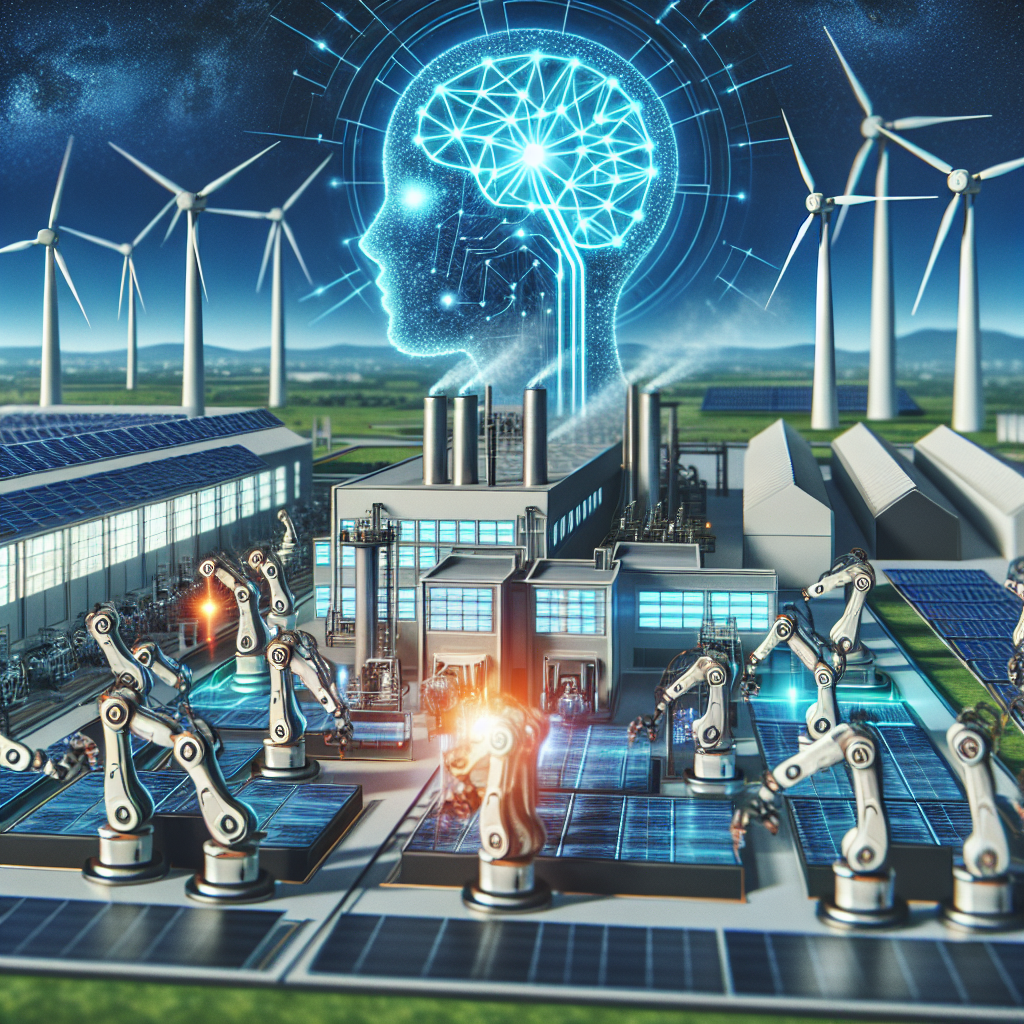The Role of AI in Sustainable Manufacturing
Artificial Intelligence (AI) is revolutionizing the manufacturing industry, offering new opportunities for increased efficiency, cost savings, and sustainability. By leveraging AI technologies, manufacturers can optimize their operations, reduce waste, and minimize their environmental impact. In this article, we will explore the role of AI in sustainable manufacturing and how it is transforming the industry.
1. What is AI in Manufacturing?
AI refers to the simulation of human intelligence in machines that are programmed to think, learn, and solve problems like humans. In the context of manufacturing, AI technologies such as machine learning, natural language processing, and computer vision are being used to automate processes, improve decision-making, and drive innovation.
AI can analyze large volumes of data, identify patterns, and make predictions to optimize production processes, reduce downtime, and improve product quality. By using AI-powered systems, manufacturers can achieve greater efficiency, lower costs, and reduce their environmental footprint.
2. How AI is Driving Sustainability in Manufacturing?
AI is playing a crucial role in driving sustainability in manufacturing by helping companies to reduce waste, energy consumption, and emissions. Here are some ways AI is making manufacturing more sustainable:
– Predictive Maintenance: AI-powered predictive maintenance systems can analyze sensor data from equipment to predict when a machine is likely to fail. By identifying potential issues before they occur, manufacturers can avoid costly downtime, reduce maintenance costs, and extend the lifespan of their equipment.
– Energy Efficiency: AI algorithms can optimize energy consumption by analyzing production data, identifying inefficiencies, and recommending ways to reduce energy usage. By implementing energy-saving measures, manufacturers can lower their carbon footprint and reduce their operating costs.
– Waste Reduction: AI can help manufacturers to optimize their production processes and minimize waste by identifying opportunities for resource efficiency. By analyzing data on materials usage, production yields, and quality control, AI systems can recommend ways to reduce waste and improve sustainability.
– Supply Chain Optimization: AI technologies can track and analyze supply chain data to optimize inventory levels, reduce transportation costs, and minimize environmental impact. By predicting demand, identifying bottlenecks, and optimizing logistics, manufacturers can streamline their operations and reduce their carbon footprint.
3. Case Studies: How AI is Driving Sustainability in Manufacturing
– Siemens: Siemens, a global technology company, has implemented AI-powered predictive maintenance systems in its manufacturing plants to reduce downtime and improve efficiency. By analyzing data from sensors, AI algorithms can predict when a machine is likely to fail, allowing Siemens to schedule maintenance proactively and avoid costly disruptions.
– Ford: Ford, a leading automotive manufacturer, is using AI to optimize its production processes and reduce waste. By analyzing data on materials usage, production yields, and quality control, Ford can identify opportunities for efficiency improvements and waste reduction. As a result, Ford has been able to increase its sustainability performance and reduce its environmental impact.
– Unilever: Unilever, a multinational consumer goods company, is leveraging AI to optimize its supply chain and reduce its carbon footprint. By analyzing data on transportation routes, inventory levels, and demand forecasts, Unilever can optimize its logistics operations and minimize environmental impact. As a result, Unilever has been able to reduce its transportation costs and improve its sustainability performance.
4. Challenges and Opportunities
While AI offers significant benefits for sustainable manufacturing, there are also challenges that need to be addressed. Some of the key challenges include data privacy concerns, lack of skilled AI talent, and integration with existing systems. Manufacturers need to invest in training their workforce, developing AI capabilities, and ensuring data security to fully leverage the benefits of AI technologies.
However, the opportunities presented by AI in sustainable manufacturing are vast. By implementing AI-powered systems, manufacturers can achieve greater efficiency, lower costs, and reduce their environmental impact. AI technologies can help companies to optimize their operations, reduce waste, and minimize their carbon footprint, leading to a more sustainable future for the manufacturing industry.
5. FAQs
Q: How can AI help manufacturers reduce waste?
A: AI technologies can analyze production data, identify inefficiencies, and recommend ways to reduce waste by optimizing production processes and minimizing resource usage.
Q: What are the benefits of using AI in predictive maintenance?
A: AI-powered predictive maintenance systems can help manufacturers to avoid costly downtime, reduce maintenance costs, and extend the lifespan of their equipment by predicting potential failures before they occur.
Q: How can AI optimize energy consumption in manufacturing?
A: AI algorithms can analyze production data, identify energy inefficiencies, and recommend ways to reduce energy usage by optimizing production processes and implementing energy-saving measures.
Q: How can AI improve supply chain sustainability?
A: AI technologies can track and analyze supply chain data to optimize inventory levels, reduce transportation costs, and minimize environmental impact by predicting demand, identifying bottlenecks, and optimizing logistics.
In conclusion, AI is playing a crucial role in driving sustainability in manufacturing by helping companies to reduce waste, energy consumption, and emissions. By leveraging AI technologies, manufacturers can optimize their operations, reduce costs, and minimize their environmental impact. As the manufacturing industry continues to evolve, AI will be a key enabler of sustainable practices and a more efficient and environmentally friendly future.

